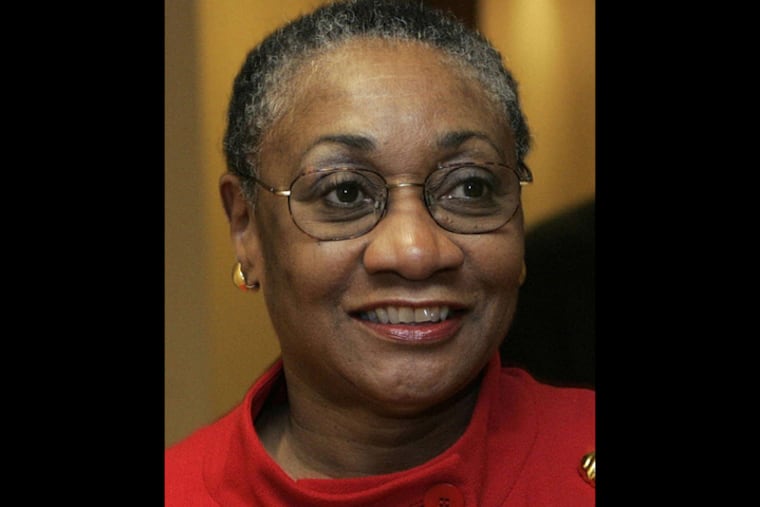Attorney Cynthia Baldwin was formally reprimanded for her handling of the Jerry Sandusky scandal at Penn State
Pennsylvania’s disciplinary board for lawyers formally castigated a former state Supreme Court justice, saying her legal work in the Penn State child sex-abuse scandal was marked by “incompetence” that violated the rights of top university administrators.

Pennsylvania’s disciplinary board for lawyers formally castigated a former state Supreme Court justice Wednesday, saying her legal work in the Jerry Sandusky child sex-abuse scandal was marked by “incompetence” that violated the rights of top Pennsylvania State University administrators.
“You failed in your responsibilities,” Cynthia Baldwin was told by James C. Haggerty, chair of the Disciplinary Board of the state Supreme Court. “You failed to recognize the magnitude of the challenge that you faced.”
For Baldwin, the reprimand was a bitter end to an ordeal that began almost a decade ago, when the investigation into Sandusky and Penn State’s response to his wrongdoing dominated national news.
The board officially delivered a reprimand that had been ordered by the high court in February. The session was conducted on YouTube because of the coronavirus pandemic. Baldwin, 75, her frowning face visible within a box on the livestream, was silent throughout the six-minute denunciation.
The court found that the former justice violated four provisions of the state ethics code for lawyers. Among them was improperly revealing the confidences of former Penn State president Graham B. Spanier and two other former top administrators, which Haggerty said led to criminal charges against them.
Sandusky, a longtime assistant to Penn State football coach Joe Paterno, is serving at least 30 years in prison for molesting 10 boys. Prosecutors later said top administrators quickly decided not to alert authorities about a key allegation against Sandusky, and later misled investigators and hid evidence about their actions.
Before becoming a justice, Baldwin, a Democrat, spent 16 years as an Allegheny County Court judge. She was the first Black woman to win election to the county bench. Gov. Ed Rendell appointed her to the high court in 2006. She served out the final two years of a departing justice’s term, then stepped down, and in 2010 became general counsel for Penn State. She was also on Penn State’s board.
At crucial sessions before an investigative grand jury in 2011, she sought to represent both Penn State as an institution and the three administrators who were under investigation for a suspected cover-up: Spanier, vice president Gary Schultz, and athletic director Tim Curley. All three would later be arrested in the scandal.
Two Common Pleas Court judges found no fault with Baldwin’s multiple roles. But in a scathing 2016 opinion, Superior Court tossed out the most serious charges against the three men because of her conduct.
The appeals court said Baldwin and a top state prosecutor in the case, Frank Fina, had both violated the men’s rights. It said Fina had wrongly called Baldwin herself as a witness against the men in a later grand jury proceeding.
The counsel to the lawyers’ disciplinary board then filed complaints against Baldwin and Fina. Review panels later rejected both complaints.
In Baldwin’s case, her review panel issued a 43-page opinion in 2018 concluding that she had fully briefed the three men on her various legal roles. Moreover, the panel said, the men lied to her about their lenient response to Sandusky, falsely leading her to think no conflict existed between them and Penn State. The panel said she had a right to testify before prosecutor Fina about their lies in part to make it plain she had not joined in their cover-up.
Though the panels effectively cleared Baldwin and Fina, the full board rejected that view and urged the Supreme Court to discipline them. The court did so, imposing its harsher punishment on Fina. His law license was suspended for a year and a day, while Baldwin faced only the verbal reprimand.
In his remarks Wednesday, Haggerty painted Baldwin as in over her head in a complex criminal case and oblivious that the probe had moved beyond Sandusky to the three administrators.
“Despite the enormity of the situation,” said Haggerty, a Philadelphia personal-injury lawyer, “you failed to prepare yourself or your clients for the grand jury testimony in even the most basic manner.”
Haggerty said Baldwin, because of her missteps, fatally undermined the cases against the administrators.
After Superior Court threw out the most serious felony perjury and obstruction charges against the trio, Curley and Schultz pleaded guilty to misdemeanor charges of child endangerment. Each served less than three months behind bars.
Spanier went to trial and was found guilty of the same misdemeanor. That verdict was overturned last year by a federal judge who ruled that Spanier had been convicted under a statute not in effect when he was at Penn State.